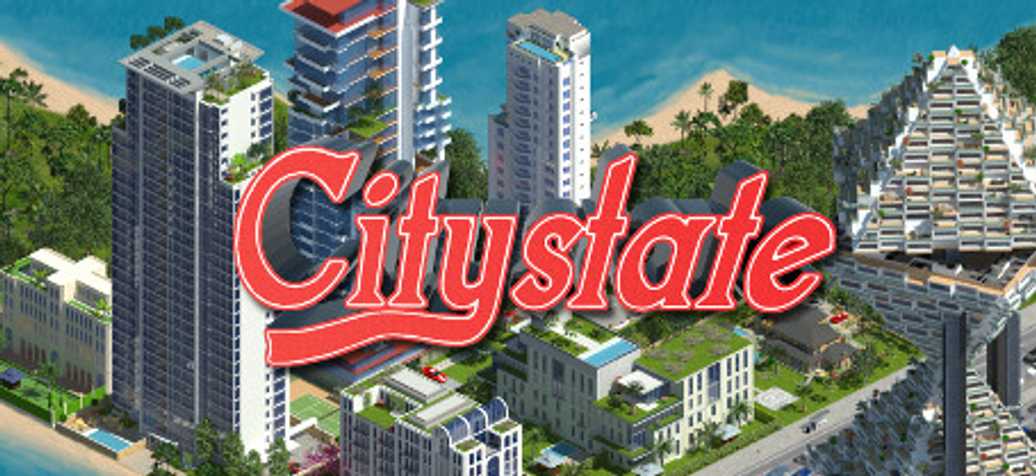Citystate
I find this to be one of the more baffling city builders I’ve played, and I have played several . In each, I always take a step back to look at the political philosophy and the ethos undergirding how the game conceives of a city and its role in the world. Sometimes, this is an exercise in absurdity . Other times, the political ethos is on the surface, but clearly not meant to be the point . Citystate is different. From the outset, it presents itself as a game concerned with every element of building a city. It is explicitly interested in the implications of political ethos on a city’s outcomes, and bills itself as a vehicle through which the player can experiment and discover those outcomes. It is, essentially, the city builder meant for people like me, people who look at cities holistically and as part of a greater ethos.
I promise, this game did not want me specifically delving into it, though.
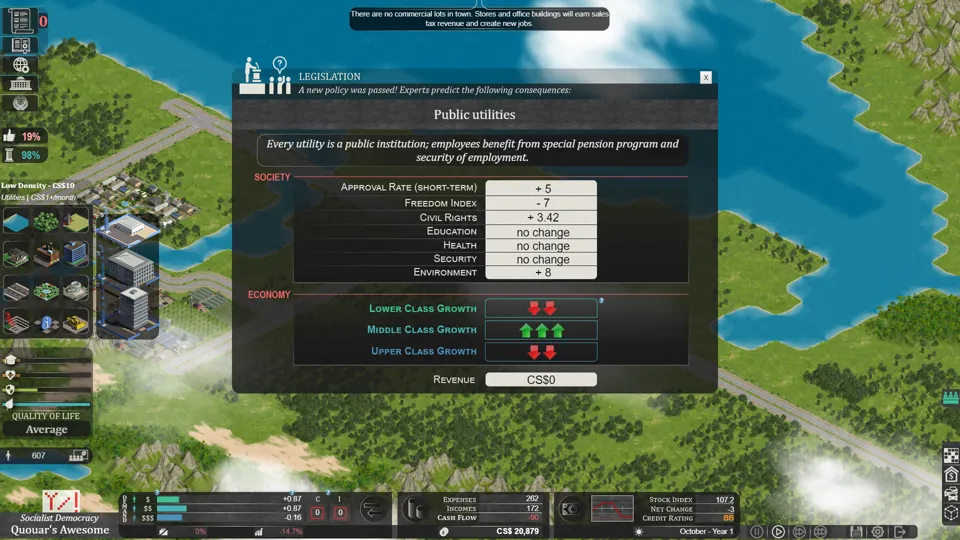 /cracks knuckles
/cracks knuckles
Citystate is a city builder, though as its name suggests, it’s less concerned with building a city specifically, and more concerned with taking a holistic look at governance, economics, and planning for a nation generally. The player has no particular task beyond building a city-state to the best of their ability, and as a result to be more holistic, that includes building the governmental system that decides the fate of that city-state. This is a game that is intimately and explicitly concerned with the politics of cities. Its mechanics center less around traffic logistics and zoning, and more with the impact of political decisions on a city’s economic development. Indeed, many of the ways in which it chooses to model the logistical and city planning elements of cities are nonsensical, and so the game forces the player to think politically, to consider their actions in the context of resident approval, and to recognise the impact of governance on growth.
This is, in many ways, the city builder I’ve been looking for. It isn’t asking me to dig in in any particular depth to root out its political philosophy. I don’t have to analyse its mechanics to decide how it feels about the concept of growth and what it says about the human condition. Citystate puts its philosophical ideas front and centre.
And it lies about them. Blatantly. Obviously. Hilariously.
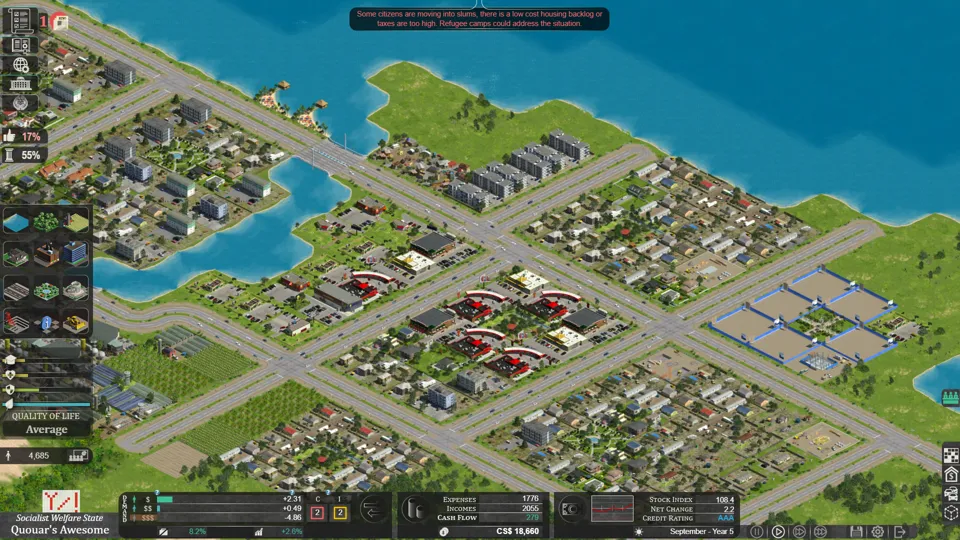 “Oh no! There’s a housing shortage! Have you tried putting the poors into camps?”
“Oh no! There’s a housing shortage! Have you tried putting the poors into camps?”
When starting a new game of Citystate, the game asks you to make a few decisions about your city-state’s prevailing ideology. Do your people view government as a protector or a burden? Are taxes a shared responsibility, or theft? These sorts of questions are meant to shape the government and populace of the city-state you’re about to build and manage, but are, in fact, window dressing. It doesn’t matter whether you start with a socialist welfare state or neo-liberal tax haven - you are playing by the game’s political philosophy, not your own.
The game’s political philosophy becomes clear very early on, and becomes more disturbing as the game progresses. I consistently chose the socialist options because of course I did, but found that, outside decisions on what to regulate or how much to invest in social services, the only thing my governmental choice impacted was my approval rating. These decision points are more roleplay experiences than actual policy choices. They serve to let the player decide whether to agree with their populace, or disagree. When the game’s core policy mechanic - beyond the standard city-builder mechanic of taxes and investment in services - is window dressing, it leads to the interesting question of what element of political philosophy the game is actually trying to express.
By far the most interesting aspect of Citystate is not its claim at a holistic political simulator or - in the words of its developer - being “the (probably) most advanced economic simulator ever made.” Instead, it’s the fact that it’s playing out an objectivist fantasy of a city, complete with the xenophobic flavours of Europe’s far right. It is a vision of a city filtered through the lens of those who have centered their identity on the worship of unfettered capitalism.
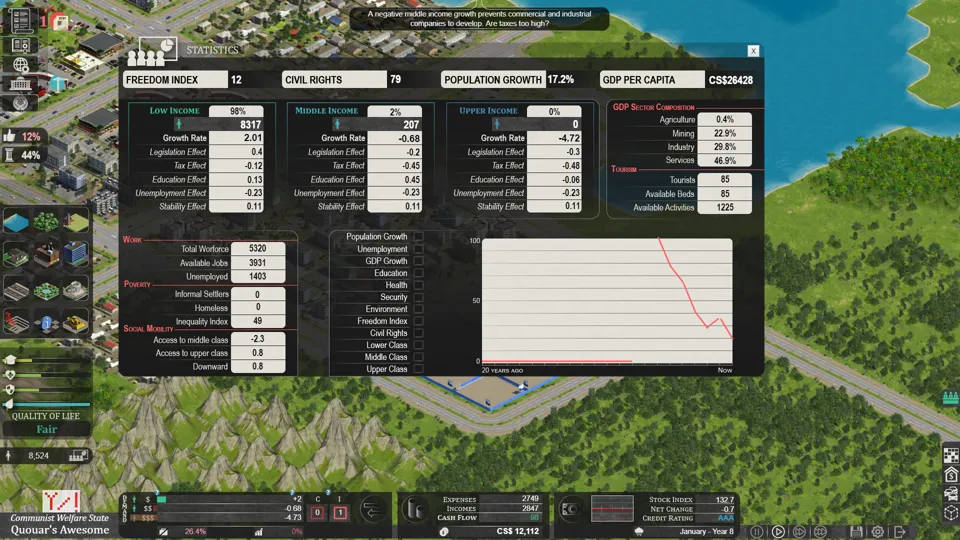 I’m curious how there can be inequality when everyone’s on the same level.
I’m curious how there can be inequality when everyone’s on the same level.
This review will not be an argument about objectivism, other than to point out how well this game demonstrates its utter inability to be an effective governing philosophy. So many of the flaws in gameplay, I’d argue are not flaws, but deliberate choices and obvious outcomes from the decision to base this game in objectivism.
As an example, in trying to ensure that the people of my city had good housing, I built a variety of housing structures, and dropped parks in their centre, creating a walkable, livable space. To ensure they had a good quality of life, I invested in education and healthcare, fueled by heavy exports and upper income taxes. To mitigate my traffic problems, I built radial roads and tried to invest in public transit. I built social housing, and provided a wide range of jobs. My city maintained positive cash flow, positive approval, and positive stability, and yet the game kept popping up with warnings. “You’re driving away corporations and the high income,” it warned. “There are growing slums.” A constant barrage of warnings, telling me that, despite happiness and stability, my city was fundamentally flawed.
The ugly truth about capitalism is that it requires an underclass. Capitalism only succeeds on the back of the oppressed. It’s why minimum wage doesn’t rise with inflation. It’s why millennials are shunted into low paying jobs despite being highly educated. It’s why poverty an accepted state of being for billions of people. When a small group profits off the labour of the masses, inequality is an inherent feature of the system. There must always be an underclass to labour if the upper class is to profit.
That ugly truth is reflected in how Citystate models my city’s economy. The game is built with capitalist assumptions, and assumes there will be inequality, as without inequality, capitalism cannot function. When I invested in good housing and good education for my people, the game didn’t recognise I was trying to raise the collective standard of living. It assumed I wanted to only build houses for the rich and leave the rest to the streets, that I wanted to play slumlord, when in reality, I wanted to give everyone an equal shot. In trying to build an equal society, the game applied capitalism’s ruleset, and threw a tantrum. My little city couldn’t be successful, it argued, because I was happily trying to eliminate the conditions needed for success under capitalism.
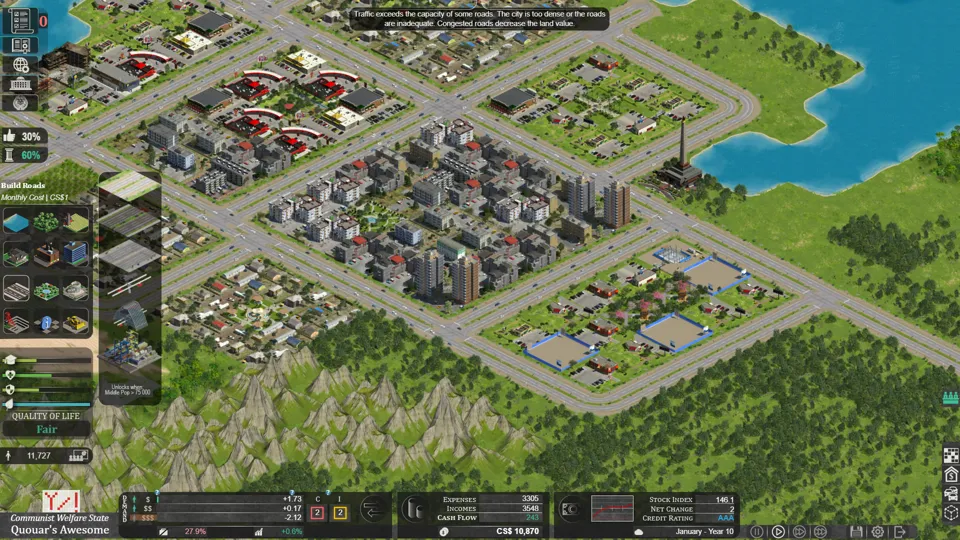 “The greatest threat posed by traffic is the decrease in our land value! Krfufufufufufufuf!”
“The greatest threat posed by traffic is the decrease in our land value! Krfufufufufufufuf!”
There’s nothing wrong with a game having a particular political philosophy. I don’t even object to a game being explicitly pro-capitalism or objectivist. Games provide a space to explore ideas and ideologies we otherwise might never engage with, or to provide a space where we can consider those ideas in a new light. For city builders in particular, I’d argue it’s impossible to have a city builder without it being undergirded by some sort of political ideology, whether that be neo-liberalism or some other ideology.
The issue comes in when a game hides that it is advocating for a particular ideology under the guise of being “the (probably) most advanced economic simulator ever made.” It presents itself as a space to explore, when in fact, it is pure propaganda. It hides that there is only one answer to the problem it’s presenting, then dulls the player’s inclination to curiosity by reassuring them that there are a variety of solutions. It lies to its players.
And then you add in the xenophobia.
 oh no
oh no
It’s an interesting irony that, politically speaking, those politicians who are the most pro-capitalism are also those who are generally most anti-immigrant. Capitalism, after all, requires an underclass to function, and economic refugees tend to be willing to do the jobs that their domestic counterparts will not. Economic refugees are that underclass just waiting to happen. A cynic might look at the contradiction of ideas and say that the reason pro-capitalist politicians are anti-immigrant has less to do with capitalism and its fundamentals, and more to do with xenophobia, but who am I to be a cynic? All I’m pointing out is that Citystate is game that hasn’t necessarily invested in its graphics budget, and that’s fine. It’s evoking a particular Sim City-esque aesthetic that works well for it, and it doesn’t need to do more than that. Despite that, there seems to be particular care taken with how a “caravan” of “migrants” is animated. It appears from the corner of the map, a black swarm, evoking the image of insects, with the only way to know it’s people being to mouse over it to see the label “migrants.”
And then, if it wasn’t clear what this game is, if all the little things didn’t make it abundantly clear what this game believes, it all hits home.
Citystate bills itself as a city-builder interested in exploring political ideologies and the fundamentals of economics. There is absolutely space for a game like that, and I’d be interested in playing a true economic city-builder. Citystate is not that game. Citystate isn’t even the neo-liberal fever dream that most city-builders are. Citystate is an unabashed love letter to the moral righteousness of selfishness that objectivism posits as the ultimate good. It whole-heartedly believes in capitalism the saviour, but the version of capitalism that thrives on exploitation, dehumanisation, and vilification of those who relegated to its underclass. It poses as a place for the player to explore politics and economics, but in the end, is only interested in promoting a broken and evil worldview. It is the city-builder of Viktor Orban, of Giorgia Meloni, of Geert Wilders.
It is the city-builder of dystopias.
Developer: Andy Sztark
Genre: City Builder
Year: 2018
Country: Italy
Language: English
Play Time: Until The Shareholders Demand A Change To The Board
Youtube: https://youtu.be/tnxtfQsg8yc
